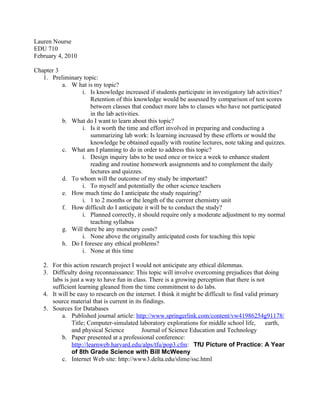This document outlines a proposed action research project to study whether student participation in investigatory lab activities increases knowledge retention compared to classes without labs. The researcher plans to design inquiry labs to be used 1-2 times per week to complement lectures and homework for a chemistry unit. They do not foresee any ethical issues. The literature review will focus on 3 sources found: 1) a study using online lab simulations, 2) a paper describing a teacher's curriculum employing "Teaching for Understanding", and 3) a website providing details on small-scale chemistry labs and a supporting journal article finding students enjoyed these labs more and had better understanding.

